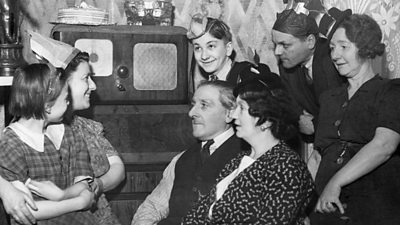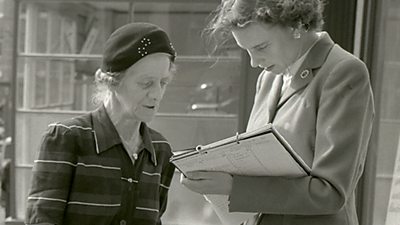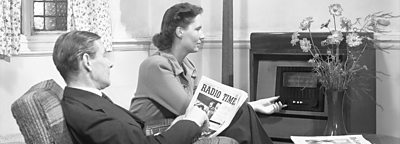Did the launch of Radio 1, 2, 3, and 4 in September 1967 mark a recognition that radio was now suddenly a 'background' medium – where people no longer tuned-in specially for individual programmes and stopped doing other things while they listened?

Fascinating insights into how we’ve listened to radio across the years can be gleaned from Mass Observation, an archive of diaries and other personal writing detailing everyday life in Britain since 1937. The Mass Observation project had temporarily ceased by the ‘60s and ‘70s, but its files contain useful evidence of listening practices both before and after 1967. And they reveal some remarkable changes – and continuities- across the decades.
In March 1949, for instance, Mass Observation interviewed 200 Nottingham householders about their listening habits. The survey captures a time when radio was still the box in the corner of the sitting-room: as yet, very few residents would have had a TV set of their own.
-
Copyright Mass Observation Trustees and Adam Matthew Digital
In this document, we discover that just over two-thirds of those questioned said evenings were the time they listened most. Indeed, only seven out of a hundred Nottingham listeners identified mornings as their main period of listening. On Sundays, nearly half left the radio on for most of the day. But on every other day people were far more likely to tune-in specially for a favourite programme than to leave their sets rumbling on in the background. It seemed that in 1949 at least radio was still very much a ‘foreground’ medium. TV had arrived, but it hadn’t yet re-shaped the way most of us listened.
One other revealing passage concerns the appeal of ‘foreign’ stations – such as Radio Luxembourg or the American Forces Network:
"IV Foreign Listening
63% of households in all districts do not listen at all to any foreign programmes. Luxembourg is the most popular foreign station (17% of the total: 23% of St Annes) followed by the American Forces Network (14% of the total; 18% in St Annes). French stations 4% and Hilversum 3%. In Sherwood and West Bridgeford, non-European stations are heard by 12% and 11% respectively.
The main reason for listening to foreign stations appears simply to be a liking for the music they broadcast. Two thirds of such listening takes place mainly in the evenings."
- ‘Foreign Listening’, in File Report 3099 ‘Radio listening in Nottingham’. March 1949 (Copyright Mass Observation Trustees and Adam Matthew Digital)
Listening to Luxembourg and the American Forces Network was clearly a minority interest – though a significant one. Nearly one-in-five listeners would tune into Luxembourg at some point each week; in the predominantly working-class St Anne’s area of Nottingham that figure rose to one-in-four. It’s a useful reminder that the ����ý faced stiff competition even in 1949. And it’s interesting to see the main reason for people abandoning the ����ý: they preferred the music played by the foreign stations. It was a foretaste of the pirates’ appeal in the ‘60s.
We get a richer picture of individual listener attitudes from another set of 1949 documents. In July that year Mass Observation sent a ‘directive’ to its volunteer writers – asking them for details about various aspects of home life, including their views on prominent radio personalities of the time and whether they liked ‘crooning’ or ‘singers of dance music’.
DIRECTIVE - JULY 1949
Please send in your replies to Mass Observation as soon as possible and not later than 30th July 1949.
1. What are your six main grumbles at the moment? (This question has been asked regularly both during and since the war.)
2. How far does your immediate family do things as a group, and how far do the members pursue individual leisure or household activities? Please give as many examples as possible of both joint and individual ventures.
3. a) Please list in the order in which you like them the following radio personalities, giving reasons in detail for your opinion of them: Charlie Chester; Richard Murdoch and Kenneth Horne; Joy Nichols and Jimmy Edwards; Wilfred Pickles; Ted Ray; Jack Train; Stewart McPherson; Bebe Daniels, Ben Lyon and Vic Oliver.
b) Are there any other broadcasters of any description who you think have a radio personality. If so, who are they, and why do you think this?
4. Do you ever listen to 'crooners' or singers of dance music? If so, are there any that you particularly like or dislike?
- Mass Observation Archive Directive, July 1949 (Copyright Mass Observation Trustees and Adam Matthew Digital). Questions 3 and 4 concern radio.
Among the 447 replies sent in, we find quite a few examples of people apparently not always listening to their radio very attentively. One person talked of listening to crooners but also 'not to notice their names'. Another mentioned a liking for various personalities but also said that “I can’t think of them at the present moment”.
A respondent from London posted back a more detailed diary of listening over several years. She frequently made comments about only 'half' listening while doing other work in the house – though also occasionally stopping what she was doing to listen transfixed to something that caught her attention. Often, she didn’t catch a whole programme. But she didn’t worry about it. For her, at least, radio was to some extent a background medium – though still a central part of domestic life.
Indeed, the overwhelming impression is that, whether being attentive or not, most listeners held very strong views about what they liked and didn’t like. The very same Londoner who apparently often “half listened” also used her diary to make very detailed and astute comments on almost everything she’d heard: why a programme irritated or delighted her, whether the presenter had a good voice or a sincere manner, whether a programme was inspiring or depressing.
And when it came to answering directly Mass Observation’s question about which personalities they really liked, few were afraid to express an opinion.
Wilfred Pickles, had brought his Yorkshire accent to the ����ý’s airwaves as a newsreader during the war and was now hosting Have a Go, a regular touring show featuring chat and quizzes with members of the public.
In 1949, it would appear he was the People’s Favourite by quite some margin:
3. Wilfred Pickles because he seems to take a genuine interest in people and places. He can make people laugh together and be happy together - not simply at a personer or performance - and laugh with them and get them to laugh at themselves.
Of the others, I must confess I only know the names of Stewart Macpherson, Bebe Daniels and Vic Oliver - but I don't seem to have listened in to them - sorry!
- DR1052 reply to Mass Observation Archive Directive, July 1949 (Copyright Mass Observation Trustees and Adam Matthew Digital).
Others wrote of Pickles’ ability to be “sympathetic and not detached from reality”, that he “seems to take a genuine interest in people and places”, that he laughs with people not at them. “Wilfred Pickles has the ‘common’ qualities of a crust of home baked bread or a piece of country cheese”, wrote one respondent: “I always feel his ‘friendship’ to all he talks with, his genuine interest in simple homely every-day things and people”.
When it came to what answering Mass Observation’s question about crooning – an intimate style of singing that many viewed as overly sentimental and dangerously American – all warmth evaporated:
Question 4. Crooners and dance music singers? NO. They make me feel physically sick, especially the Americans Judy Garland, the Andrews Sisters, Dinah Shore and even Bing Crosby.
- DR1048 reply to Mass Observation Archive Directive, July 1949 (Copyright Mass Observation Trustees and Adam Matthew Digital).
Other comments were in similar vein: “I loathe crooners”, “I dislike all the Old-Time dance bands”, and so on.
It seems that in 1949, whatever the Nottingham survey suggested, lots of Britons were already treating radio as a background medium. But that didn’t mean we were listening uncritically. At was as if radio was effective at slipping into the nation’s consciousness – becoming an integral part of our daily lives – precisely because it didn’t demand all our attention every time it was switched on.
Jump forward over fifty years – to the summer of 2001 – and we find that radio still seems to be something listened to both casually and with passion.
In that year, prompted by the success of Big Brother on TV, Mass Observation sent out a directive asking its panel of writers to comment on “Reality TV” and “Reality Radio”. In the case of the latter, this meant programmes such as Desert Island Discs and In the Psychiatrist’s Chair on ����ý Radio 4.
The replies reveal vividly how starkly many of us think of the differences between the two media. With radio, for example, there’s that casual approach: the listener who caught The Archers only if she was in the bath at the right time. And there’s that passion: the listener who finds In the Psychiatrist’s Chair to be “a cathartic experience”. Most of all, though, there’s a sense that when it comes to “reality” formats radio remains somehow less intrusive, less voyeuristic:
"Radio & TV are very different things. The visual element and the all-pervasive power of TV adds a huge dimension which radio doesn't have. It's more intrusive, more obvious and everything which happens is amplified. Desert Island Discs is a more controlled, less exposed environment, where a personality can talk about his/her life within certain parameters. The all-invasive, daily coverage of the minutiae of people's lives in Big Brother, for example, is an entirely different event."
-A2801, reply to Mass Observation Project Directive, Summer 2001 (Copyright Mass Observation Trustees).
PART 2: "REALITY TELEVISION & RADIO"
I have never watched Big Brother nor Survivor although I suppose i should have tried them. it just appeared that there would be more bad temper, swearing and humiliation than I could stomach. On the other hand I have enjoyed may of the This Is Your Life and Desert Island Discs programmes. These generally are very interesting in a calm if sometimes emotive atmosphere. The choice of music is often fascinating in the latter programme. I feel that the personality involved is being him/herself and not acting. In the Psychiatrist's Chair was quite good though Professor Clare could be irritating with some of his silly questions and I would like to hear him being "analysed"!
- B89, reply to Mass Observation Project Directive, Summer 2001 (Copyright Mass Observation Trustees).
Part 2 'Reality' television and radio
I tried to listen to all I could of In the Psychiatrist's Chair and always felt [unclear] would not shrink to embarrass his subjects I always find of interest. With Desert Island Discs I usually tune in to see who the 'culprit' is and half the time I turn it off. Again I feel certain it will be kept within bounds.
- E174, reply to Mass Observation Project Directive, Summer 2001 (Copyright Mass Observation Trustees).
The Mass Observation archives, then, reveal the particular emotional attachment that radio seems to generate – and the trust people place in the medium.
But there is, apparently, one very clear limit to our tolerance: the sheer amount of reality we want in our lives. Few of us, it seems, crave more news than we currently get.
During the Gulf War of 1990-1991, Radio 4 removed many of the usual programmes from its FM channel to create a ‘rolling’ news service. Mass Observation asked us for our thoughts as the war developed – and broadcasting news coverage loomed large in the responses that came back:
Thursday 17th Jan
We woke up to hear 'war' on the radio. Last night the planes were flying overheard - unusual round here - and so we knew something was coming. We turned the radio off quote soon. The propaganda, as opposed to news, on the radio and TV has become blatant.
Thursday Jan 24th
The 5pm Radio 4 programme PM resembles an enormous war game. You can almost see the grid somewhere in the studio as the participants and experts throw dice to move their pieces. It's quote abhorrent.
Monday 28th Jan
The eternal 'news' churns out. Today we are told on the Today programme on Radio 4 that very few, if any, so-called 'targets' have been reached. This is not very surprising given that the young pilots have never flown in real battle situations before. Like many of their forebears in the last war they are dropping their bomb loads and getting out quickly. Many, many children in Iraq must have died or been injured but this type of news is censored.
Wednesday Jan 30th
Where did i get the idea Turkey was not allowing use of air bases? Today I understood Israel are sending planes there to back up the U.S. Such a plethora of news and views - you don't remember things.
The most odd thing is the way the Gulf War distorts the 'news' altogether. Apparently white people are rioting in Sound Africa concerning Black Rule - now imminent. Scenes of South African police manhandling white South Africans ought to be front page news. Also [unknown] has succeeded in getting both sides in the Ethiopian War to meet for talks in London.
Tuesday Feb 12th
Today I tuned in to Radio 4 about 11am to hear Brian Redhead of Today interviewing ad nauseam about the Gulf War. Has this been normal daily fare on FM? I understand it has. I don't understand the purpose of this media coverage. It obvious whips up some people but must surely turn an awful lot of others off. The endless discussions over tiny pieces of propaganda given out by various sources, sound like children's arguments over 'rules' in the playground. Meanwhile we grind to a halt from an inch or 2 of snow and people freeze to death on the streets for want to shelter.
- A1473, reply to Mass Observation Project Directive, Autumn/Winter 1990 (Copyright Mass Observation Trustees).
I woke in the morning with a dull feeling of gloom and dread and a huge headache. Warplans droned overhead in an echo of this feeling. The Brian Redhead Today Programme stayed on until 10 a.m. and then The World at One took over. I couldn't listen any more. I foresee horrible carnage and a war that will go on and on.
Yes, more news did come in - great waves of it. So much so, that - saturation coverage was reached by about 100.30 a.m. with me. Endless interviews with 'experts' and military men rapidly bored me.
The radio and television are swamped with war news, as are the papers. I read very little of it because most of it is MoD bullshit, i assume, and jollying-along. The ����ý appears to have run amok, re-scheduling films that could even remotely offend some Auntie Edna.
28.1.91. More depressing news - in fact, all the time depressing news comes in. The ����ý has run amok and has commandeered Radio 4 on FM, leaving the grotty old Long Wave for normal programmes. I don't listen in, but my husband does, all the time, so I catch nauseating snippets as I go down to his room to attend to him.
i don't think the anti-war faction (allegedly 20 p.c. but i would put it higher myself) are getting a fair crack of the whip on the ����ý from what I hear. Tony Benn said today that the ����ý just becomes a tool of government when there is a war and though the interviewer tried to jib at this, i think it is manifestly true. Free speech goes right out the window.
- B1224, reply to Mass Observation Project Directive, Autumn/Winter 1990 (Copyright Mass Observation Trustees).
In the cold winter months of early 1991, the message to the ����ý was clear: in radio, not consistency but variety – the ‘rich mix’, as Reith himself might once have put it – was still what many listeners valued more than anything else.
The ����ý and pop music listeners in the 1960s

In 1967, the outside world often assumed that pop was being forced onto an unwilling and uncomprehending ����ý. But documents in its written archives suggests the Corporation had long been aware of the audience demand for such a service. They also reveal how, once Radio 1 had been launched, the ����ý had a clear sense of the difficulties that would lie ahead in pleasing its new listeners.
Three documents give us some snapshots of this story – all from the ����ý’s Audience Research department. They’re from 1963, 1967, and 1969.
In the first report, dated March 1963, we discover a ����ý keen to find out more about listening to the commercial station Radio Luxembourg. It learned that audiences to Luxembourg were almost as large as those for the Light Programme – but they were considerably younger, and they listened later into the evening.
Not many children tuned-in, nor many adults aged over thirty. But among teenagers, a staggering six times as many were listening to Luxembourg as to the Light Programme. The most popular show was the Sunday evening Top Twenty, closely followed by the weekday evening shows by Pete Murray and Jimmy Young.
In our second document, dated March 1967, we find the ����ý digging more deeply into people’s musical tastes. Researchers warned that classifying kinds of music in “universally understandable terms” was a fraught business. Even so, they made some tentative observations.
They suggested, for instance, that ‘light music’ was widely liked – indeed far more so than ‘pop music’ – but that it was invariably being used as a background sound. Even the ‘serious music’ of the Music Programme’s was being listened to inattentively. Indeed, the nature of ‘background listening’ becomes one of the running themes of this Audience Research report.
But the document also reveals how musical tastes had so many subtle variants that lumping them together into catch-all categories such as ‘light’ or ‘pop’ was increasingly unhelpful in guiding the ����ý’s policy.
It also highlights the extent of the generation gap opening up when it came to ‘the very latest pop’: it was ‘almost universally liked by the 15-19 year old age group and cordially disliked by most of those over 50’.
Given that the ����ý needed Radios 1 and 2 to share the same frequency for large parts of the day, this generation gap in attitudes to pop obviously presented real problems.
Unsurprisingly, then, by August 1969, when the third piece of audience research was conducted, we see a ����ý focusing squarely on reactions to particular kinds of music being played on both Radio 1 and Radio 2. Again, the survey showed that ‘the only personal characteristic related to liked and dislikes was age’.
What’s most notable, however, is that now, two years after launch, the ����ý’s Audience Research department is able to identify more subtle distinctions between different kinds of popular music – with categories ranging from ‘Way out Pop’, through ‘R&B soul’ to ‘Strongbeat ballads’. IN fact they identified 28 categories altogether.
In this respect, the document reveals one of the underappreciated impacts of the arrival of Radio 1.
It taught the ����ý that there was in fact no such thing as ‘pop music’. Rather, there was a gloriously eclectic and ever-changing cultural scene – one that the Corporation would have to take more seriously and understand more fully in the years to come:

